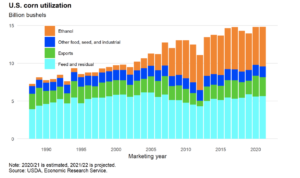The House Agriculture Committee advanced the Republican-led farm bill in a 34-17 vote early Thursday after a marathon markup that was clouded by partisan fighting about the package.
EPA Proposes Cuts to the Renewable Fuel Standard
Reuters writers Stephanie Kelly and Jarrett Renshaw reported this week that, “The Biden administration on Tuesday proposed scaling back the amount of biofuels that U.S. oil refiners were required to blend into their fuel mix since the onset of the COVID-19 pandemic.
“The decision was intended to provide relief to the U.S. refining industry after the health crisis slammed domestic demand for transport fuels.
“But the proposal drew criticism from both the oil industry, which claimed the measures were not enough, and the biofuels sector, which said the retroactive move to cut blending volume mandates would hurt farmers.”
My statement on President Biden’s move to slash demand for biofuel. ⤵️ pic.twitter.com/NweFXAO64K
— Joni Ernst (@SenJoniErnst) December 7, 2021
The Reuters article explained that, “In Biden’s first major biofuels policy decision, the U.S. Environmental Protection Agency (EPA), which administers the policy, proposed retroactively to set total renewable fuel volumes at 17.13 billion gallons for 2020. That was down from a previously finalized rule for the year of 20.09 billion gallons, set before the coronavirus hit.
“It set volumes at 18.52 billion gallons for 2021 and 20.77 billion gallons for 2022.
“Both the 2020 and 2021 figures mark a reduction from 2019, when the EPA had required refiners to blend 19.92 billion gallons of biofuels in the nation’s fuel mix, but the 2022 proposal marks an increase.”

Kelly and Renshaw added that, “The EPA also proposed a rejection of 65 pending applications for small refinery exemptions – waivers requested by fuel producers seeking to be excused from blending mandates for financial reasons. The action, which is not final, follows a court decision that narrowed the situations in which the agency can grant exemptions.”
Gas prices are thru the roof &it makes NO sense for Pres Biden to turn his back on cleaner/cheaper biofuels The admin’s unprecedented RFS plan to retroactively cut blending levels for previous yrs is a boon for Big Oil what’s 2stop Biden admin fr slashing '22 RVOs yr after yr?
— ChuckGrassley (@ChuckGrassley) December 7, 2021
Tuesday’s article also indicated that, “In a concession to the biofuel industry, the U.S. Department of Agriculture, in tandem with the EPA’s announcement, announced $700 million in grants to biofuel producers as COVID-19 relief and another $100 million in support for biofuel infrastructure.
Scott Irwin, an agriculture economist, said the move to lower mandates for 2020 and 2021 would likely trigger lawsuits from angry biofuel producers.
Also on Tuesday, Bloomberg writers Jennifer A Dlouhy and Kim Chipman reported that, “The Biden administration sought to thread the needle between oil and agriculture interests by proposing modest quotas for the use of biofuels while seeking to block exemptions for dozens of refineries.
“The U.S. Environmental Protection Agency on Tuesday called for cutting biofuel-blending quotas retroactively for 2020, while outlining targets for this year that track actual consumption and an increase in 2022 that could boost renewable fuel use by 3.5 billion gallons.”
The admin’s failed attempt to play both sides of this issue means another gut punch to the biofuel industry. Attempting to soften the blow of today’s announcement with a slight increase in future volumes & delayed congressional assistance for biofuels from @USDA falls very short. https://t.co/BKZjeUgBWD
— Senator John Thune (@SenJohnThune) December 8, 2021
“The proposal comes as President Joe Biden battles gasoline prices near a seven-year high and inflationary pressures that threaten to undercut the U.S. economic recovery. The move follows months of deliberations over how to set the targets following a pandemic-spurred drop in fuel demand, while still encouraging greater use of biofuels made from corn and soy oil,” the Bloomberg article said.
And DTN writer Todd Neeley reported this week that, “The proposal delivers a victory to oil producers who have been asking for cuts to conventional ethanol for some time. The agency would then increase corn-ethanol volumes to 15 billion gallons in 2022.
“The negative RFS news for biofuels and agriculture was offset by EPA’s proposed rejection of the pending 65 small-refinery exemption requests for 2016 through 2021. As part of the announcement, EPA proposed a new method for determining who receives exemptions.”
The DTN article indicated that, “The EPA said in a news release its rejection of all pending small-refinery exemption requests was in response to a decision rendered by the U.S. Court of Appeals for the 10th Circuit in Denver.
“‘This decision, issued in 2020, narrowed the situations in which EPA can grant SREs,’ the agency said.
“‘EPA is sharing a proposed adjudication of pending SRE petitions that presents EPA’s approach in applying the direction from the court. The proposed decision document articulates the agency’s updated interpretation of its CAA statutory authority to grant SREs, and our analysis of the available data on RFS costs and market dynamics that compel the proposed denial.'”
Wall Street Journal writer Katy Stech Ferek reported on Tuesday that, “While he was campaigning for president, Mr. Biden said a strong biofuel mandate would help struggling rural economies where people find work at the country’s roughly 200 biorefineries.”





